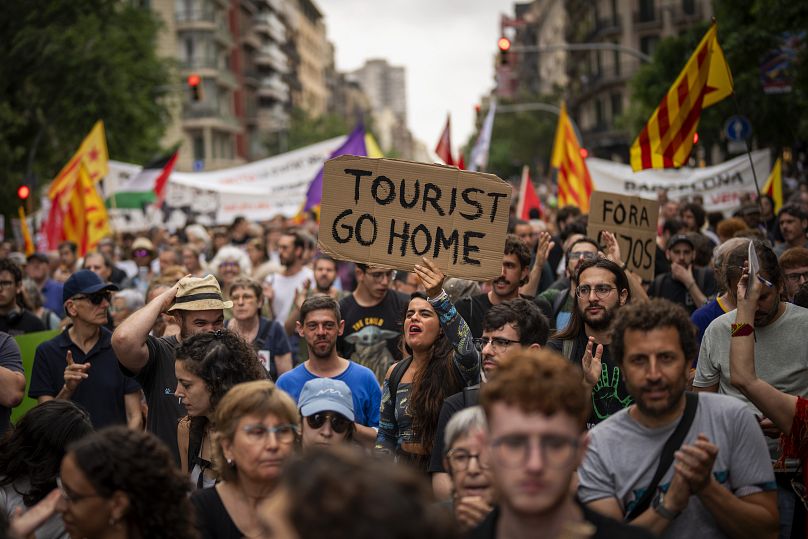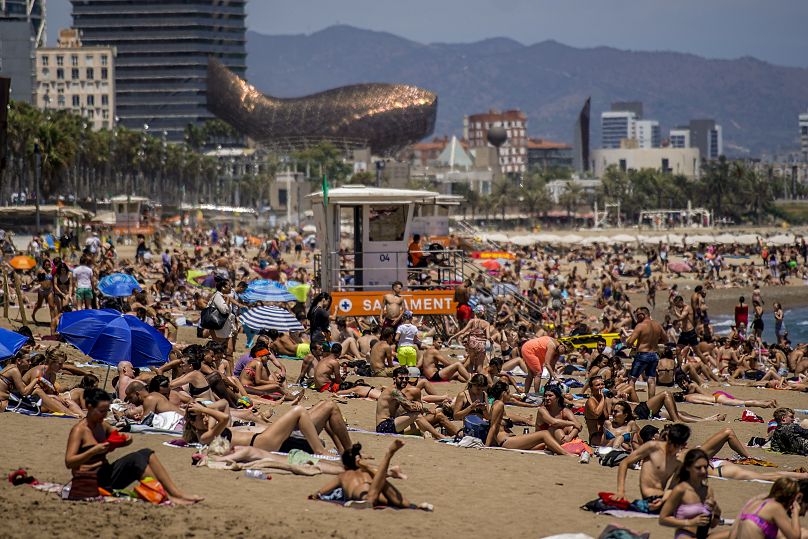Organisers of the march say uncontrolled tourist numbers are causing a drop in wages, loss of quality of life and an increase in the price of housing.
Thousands of people have demonstrated in Mallorca against what they say are the negative impacts of overtourism.
 ADVERTISEMENT
ADVERTISEMENT
 ADVERTISEMENT
ADVERTISEMENT
Organisers of the march say uncontrolled tourist numbers are causing a drop in wages, loss of quality of life, noise and an increase in the price of housing, both to rent and to buy.
"Now is the time to say enough is enough. We want concrete measures to limit and decrease the number of tourists coming and to improve the wellbeing of the local population," said Pere Joan Feminia, spokesperson for the platform 'Less Tourism, More Life', which organised the rally.
Demonstrators marched under the banner 'Let's change course - let's put limits on tourism' in an action that was joined by 110 other civic organisations.
"Since we have been living here, we have seen the rate at which tourism has grown, in an uncontrolled and unsustainable way," said one protester.
The demonstration in the middle of the tourist season aims to be, "a turning point, a blow on the table and the beginning of actions and mobilisations on the four islands, not just in Mallorca," explained the organisers.
Last year, the airport authority AENA said departures and arrivals at Palma airport for July alone were up 5.9% compared to the same month in 2022, with 4.3 million people passing through the airport.
That meant Palma was the third most popular summer destination in Spain, behind Madrid and Barcelona.
And earlier this month, thousands of Barcelona residents also protested against the impact of overtourism.
Around 3,000 people from over 140 organisations took to the streets, spraying tourists with water and shouting "tourists go home". Hotel and restaurant entrances were symbolically closed off.
They were demanding action before a summer season that experts say will set new records in the city and the wider region of Catalonia. Barcelona is Spain's most visited city receiving 12 million people a year, many of whom arrive via cruise ship.
Rising visitor numbers are putting pressure on health services, waste management, water supplies and housing at the expense of residents. Increased construction of hotel and housing developments is endangering historic sites, biodiversity and natural resources.
The city council has recently voted in favour of increasing its tourism tax up to €4 per person from October.
One of the most pressing impacts of overtourism in Spain now is the lack of housing and soaring rent prices for residents.
Málaga locals expressed their frustration earlier this year by plastering the centre of the Spanish city with stickers telling visitors what residents think of them.
The city on the Costa del Sol has long been a popular destination for foreign visitors, thanks to its sunny climate and relatively low cost of living. But with digital nomads now also piling in, the housing situation has become critical.
It is a story echoed throughout the country, where landlords have evicted long-term residents in favour of holidaymakers or pushed rents up so only high-earning digital nomads can afford them. Protests have taken place against overtourism in Spain from Ibiza to Malaga and Menorca.
The Canary Islands are experiencing a similarly drastic situation.
Activists say the over 10 million foreign visitors that holiday on the archipelago each year are ruining life there. Locals are reportedly sleeping in cars and caves due to soaring house prices.
One local organisation said the islands are "collapsing socially and environmentally" under the pressure.
But tourism is big business for Spain. The tourism lobby group Exceltur said tourism accounted for 71% of real growth in the Spanish economy last year and consumption by non-residents accounted for nearly a third of Spain's 2.5% growth in 2023, according to BBVA.
But many Spanish locals say they're not reaping the benefits.
European pushback
But overtourism isn't just restricted to the Balearic Islands. Many European countries have been putting tourist taxes in place, including Venice which has also banned cruise ships from entering its endangered canal system.
In Amsterdam, authorities and locals alike have been trying for months to encourage - mostly British - drunken tourists to stay away. And in Athens, the city’s mayor announced a tourism capacity study to set the city’s limits and to gather data on short-term rentals and hotels.
While the problem appears to be a global one, it's Spain that is leading the grassroots fight back.
Graffiti in Barcelona last year read, "We spit in your beer. Cheers!"













